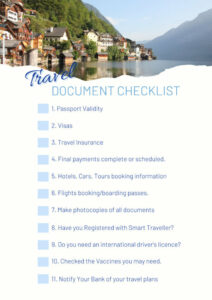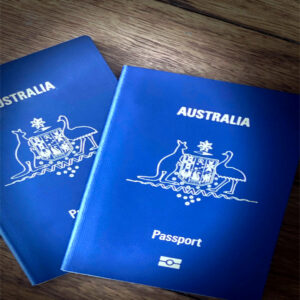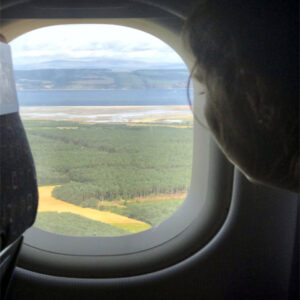It has been over a year since international travel opened up to most of the world, and many of us, are still finding our travel feet. Over the last while, I have seen a few things on the net about how we as travellers are not travel-ready, we have lost our edge, and some of the simplest things are easily forgotten or overlooked. This post will look at 11 travel Documents for Australians to check out before going overseas.
Are your Documents Travel Ready?
Your departure date is fast approaching, and the excitement of being somewhere different is building. Sitting in the back of your mind are those niggling questions, have I got all my documents in order? Here are 11 Travel Documents to help you find peace of mind.
Our 11 Travel Documents Checklist

11 Travel Document Checklist
1. Passport Validity
In Australia, it is a requirement that you have a minimum of 6 months left on your passport from the day you re-enter the country. In most cases, this should cover you for other countries; but always check the rules of the country you visit.
If you need to replace your passport, make sure you give yourself ample time to get through the process.

Australian Passport
2. Visas
Do you require a Visa? Australian passports get us to a lot of places. Many European countries have Visa-free periods, but China and Russia (for example) need more of an application process on most occasions. Some countries used to offer on-arrival visas; in this new era of travel, what is still the case? A quick google search won’t hurt; that way, you will not be caught without the correct paperwork when you arrive at your destination.
Again in this post covid world double, check requirements and allow plenty of time to get these sorted. In many countries, wait times will be longer due to demand, so plan as much as possible.
Click here to check for UK and Europe through smartraveller.
3. Travel Insurance
I know travel insurance can be a dirty word, but the moment you have to claim, you will not be sorry about the expense. Don’t forget to read the product disclosure information and ensure your policy covers your needs. You don’t want to do something extreme and find that your basic cover is insufficient if you need to claim. Another thing to note is what the covid cover is on your policy.
4. Final payments complete or scheduled.
As the departure date gets closer and those last-minute payments become due, keep track of them and any of those things you can’t book until closer to leaving. We all get busy and forget about those payments we held off for another day, but keep a log of your final payments so you are on top of them and nothing is left to chance. I have set reminders on my phone for those fast-selling activities.
5. Hotels, Cars, Tours booking information

Yurt at Kirklington Hall, UK
If you are like me, you have pre-booked every stay or have a rough idea of places you plan on booking. We can often book some pay-at-time of bookings and other things we paid for on arrival. These bookings are another excellent thing to keep a record at hand.
Have you booked and printed out or saved all the bookings in place? Or keep them in a known location on your phone. Many booking engines can store bookings and tickets in the app.
Printing them out gives you the booking conditions, address, and other contact details close at hand if you need them.
6. Flights booking/boarding passes.
Whether you check in before you leave home or are required to book at the airport, you will need information about your booking, even if it is for your reference.
Things can get pretty hectic at the airport, so whether you have the info on your phone or printed out, make sure they are accessible along with your passport and any other documentation you may need on your transit from check-in to boarding.

Plane landing in Salzburg
7. Make photocopies of all documents
We all hope nothing goes wrong while we off see amazing places, but on occasion, things happen, and we need to be ready and have copies of important docs. I know from personal experience the stress of not having copies of important things like passports. We misplaced our passports in Vienna a few years ago, and for some reason, we did not have copies of our docs on us or at home. Not having those copies added to the stress of the situation, and I would not wish that on anyone.
Docs to have copied include the information page of your passport, tickets, travel insurance policy, and bookings.
If you are interested in what we learnt when we lost our passports, read this post.
8. Have you Registered with Smart Traveller?
Smart Traveller is an Australian government agency offering travel advice from all around the world. It also has a place to register your travel plans, just in case there is a need to track Australians in a crisis in a particular area. It also gives officials the person to contact in case they need it while you are away.
Smartrallever is also a great place to keep an eye on any travel warnings that affect us Aussies.
https://smartraveller.gov.au/Pages/default.aspx

Hotel Astoria Veinna
9. Do you need an international driver’s licence?
An International Driving Permit (IDP) translates your current Australian Driver’s Licence into nine languages. I highly recommend obtaining a valid IDP before leaving Australia, especially if you are hiring a car or plan on getting a motor bile.
BONUS: double check your travel insurance for included car insurance, and then double-check that your included insurance is enough for the country you plan on hiring a car in. I know Ireland requires insurance from Ireland for hire cars, but your travel insurance coverage won’t work.

Picking a hire car up in Scotland
10. Checked the Vaccines you may need.
A quick google search will tell you what, if there are any vaccines you may need and your requirements. If still in doubt, visit a travel doctor.
In this post covid world, many things have changed and continue to change, don’t forget to check each country you visit for their covid requirements.
11. Notify Your Bank of your travel plans
As we get our 11 travel documents checked off, an important thing to tick off is not so much a document but a safety thing. Notify your bank so your accounts don’t get frozen. Banks diligently protect your money, and if they identify your spending overseas as suspicious, they may freeze your account. Most banks offer an online way to do this, even if you have to go in-branch. Make sure you notify your bank of where you are going and for how long; this is a step not to miss.

Dreaming of adventures to come flying to Scotland
BONUS: Tip
As I have said before, in this post-Covid world, things are still changing, and countries have very different ways of dealing with covid. Take the time to see how the countries you visit currently cope with covid. Most countries are just living with Covid, but this can mean different things in different places. What are the rules for that country if you test positive? How tight are their quarantine rules?
How will this affect your trip and bookings going forward?
Does your travel insurance have an adequate covid clause?
If you can book things with a good cancellation policy, it will give you peace of mind and save you money.
As we get ready to travel, I hope these 11 travel document reminders will help you prepare, and I wish you all the best as you head out on your adventures.
Are you looking for more information to help you prepare for a long-haul flight? Check out these blogs.
Travelling Together 7 tips for success
How to outsmart Pickpockets in Europe
Health and Fitness while Flying



